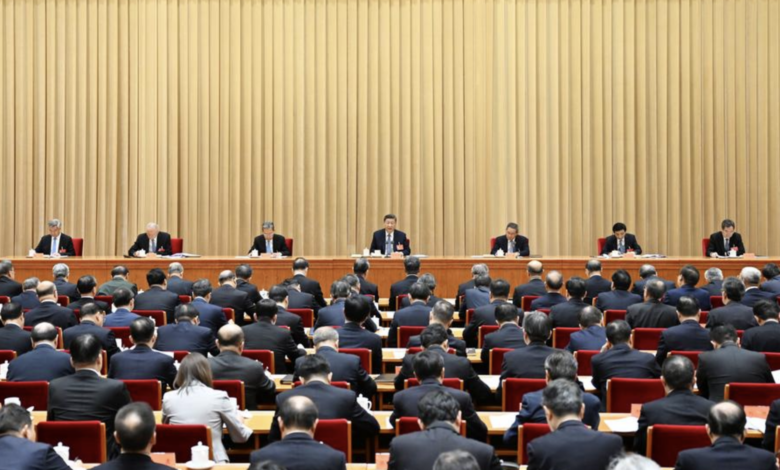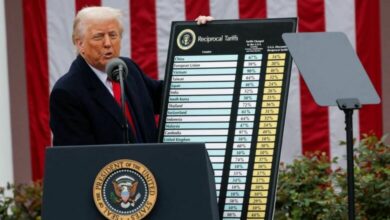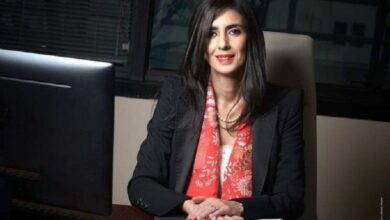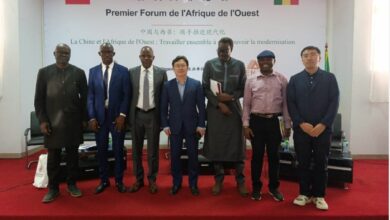Xi delivers important speech at Central Economic Work Conference

ALDAR/
The Central Economic Work Conference was held in Beijing from Dec. 11 to 12. Xi Jinping, general secretary of the Communist Party of China (CPC) Central Committee, Chinese president and chairman of the Central Military Commission (CMC), attended the conference and delivered an important speech. Li Qiang, Zhao Leji, Wang Huning, Cai Qi, Ding Xuexiang and Li Xi, all members of the Standing Committee of the Political Bureau of the CPC Central Committee, also attended the conference.
In his speech, Xi summarized the economic work in 2024, analyzed the current economic situation and arranged the economic work for 2025. Li Qiang delivered a summary speech, in which he laid out requirements for implementing the guiding principles of Xi’s speech and doing a good job in economic work next year.
This year marks a crucial year for achieving the objectives and tasks laid down in the 14th Five-Year Plan (2021-2025), said the conference. In the face of a complicated and challenging environment of increasing external pressure and growing internal difficulties, the CPC Central Committee with Comrade Xi Jinping at its core has united and led the entire Party and the Chinese people of all ethnic groups to respond calmly and implement comprehensive measures. As a result, the economy has maintained overall stability and made steady progress, the high-quality development has been solidly promoted, and the main goals and tasks of economic and social development are expected to be successfully completed. The country has steadily developed new quality productive forces, continued to deepen reform and opening up, orderly and effectively defused risks in key areas, safeguarded people’s livelihood in a solid and vigorous manner, and made new solid strides forward in advancing Chinese modernization. The development journey over the past year has been extraordinary, with encouraging achievements. Notably, the decisive deployment of a package of incremental policies at the meeting held by the Political Bureau of the CPC Central Committee on Sept. 26 has effectively boosted social confidence and led to a remarkable economic recovery.
It was pointed out at the meeting that the adverse impacts brought about by changes in the external environment have deepened, and the country’s economy still faces many difficulties and challenges, primarily including the insufficient domestic demand, operational difficulties in some enterprises, pressures on people’s employment and income growth, and many hidden risks. At the same time, it must be recognized that Chinese economy is underpinned by a stable foundation, multiple advantages, strong resilience, and great potential, and the supporting conditions and fundamental trends for long-term sound economic development have not changed. We must face up to the difficulties, strengthen our confidence, and strive to transform all positive factors into actual achievements in development.
The meeting pointed out that, through practice, we have continuously deepened our understanding of the laws governing economic work. The centralized and unified leadership of the CPC Central Committee is the fundamental guarantee for carrying out economic work well. At critical moments and important junctures, the CPC Central Committee promptly assesses the situation and makes decisions and arrangements to ensure that China’s economy braves the wind and the waves and sails steadily into the future. It is necessary to coordinate the relationship between an efficient market and an effective government to form an economic order that is both dynamic and well-regulated. The relationship between aggregate supply and demand must be properly managed to ensure the smooth circulation of the national economy. It is necessary to coordinate the relationship between fostering new drivers and upgrading old ones, and promote the development of new quality productive forces in light of local conditions. It is imperative to coordinate the relationship between optimizing incremental resources and making good use of existing resources to comprehensively improve the efficiency of resource allocation. The relationship between enhancing quality and expanding total output must be coordinated to lay a solid material foundation for Chinese modernization.
It was emphasized at the meeting that to do a good job in the economic work next year, it is necessary to follow the guidance of Xi Jinping Thought on Socialism with Chinese Characteristics for a New Era, fully implement the guiding principles of the 20th CPC National Congress and the second and third plenary sessions of the 20th CPC Central Committee, adhere to the general principle of pursuing progress while maintaining stability, as well as fully and accurately implement the new development philosophy on all fronts. It is also essential to accelerate the forging of a new development paradigm, solidly promote high-quality development, further deepen reform comprehensively, expand high-standard opening up, build a modern industrial system, better coordinate development and security, implement more proactive and impactful macro policies, expand domestic demand, promote the integrated development of scientific and technological innovation and industrial innovation, stabilize the real estate and stock markets, prevent and resolve risks in key areas and external shocks, stabilize expectations and stimulate vitality, promote sustained economic recovery, continuously improve people’s living standards, maintain social harmony and stability, and fulfill the goals and tasks in the 14th Five-Year Plan with high quality and lay a solid foundation for a good start to the 15th Five-Year Plan (2026-2030).
For next year, it is a must to maintain steady economic growth, keep employment and prices generally stable, ensure a basic equilibrium in the balance of payments, and increase residents’ income in step with economic growth, the meeting noted.
It was required at the meeting that next year, the country should continue to seek progress while maintaining stability, promote stability through progress, uphold fundamental principles and break new ground, establish the new before abolishing the old, pay attention to integrated reforms, and strengthen coordination. The policy toolkit should be enriched and improved, and macro regulation should be more forward-looking, targeted and effective.
The country should adopt a more proactive fiscal policy. It should set a higher deficit-to-GDP ratio and ensure that its fiscal policy is continuously forceful and more impactful. Efforts will be made to increase the intensity of fiscal spending and strengthen support for key areas. The country will increase the issuance of ultra-long special treasury bonds and continue to support projects for implementing major national strategies and building security capacity in key areas, as well as implementation of large-scale equipment upgrades and consumer goods trade-in programs. It will also increase the issuance of local government special-purpose bonds, and expand the areas of their investment and use as project capital. It is also required to optimize the structure of fiscal expenditure, use government funds to greater effect, pay more attention to improving people’s lives, promoting consumption, and sustaining growth momentum, and see that basic living needs are met, salaries are paid, and governments function smoothly at the primary level. Party and government departments should keep their belts tightened.
A moderately loose monetary policy should be implemented, the meeting noted, calling for efforts to leverage the function of monetary policy tools in both quantity and structural terms. It said the reserve requirement ratio and interest rates should be reduced at an appropriate timing, noting that ample liquidity should be maintained and that the growth of social financing and money supply should match the expected targets for economic growth and price levels. The RMB exchange rate should be kept basically stable at a reasonable and balanced level. Explorations will be made to expand the central bank’s function in macroprudential regulation and financial stability, innovate financial instruments, and keep the financial market stable.
The meeting called for better policy coordination. It demanded strengthening coordination between fiscal, monetary, employment, industrial, regional, trade, environmental and regulatory policies and the country’s reform and opening up measures, improving inter-departmental mechanisms for effective communication and consultation and feedback, and increasing policy synergy. It is imperative to include economic and non-economic policies in the evaluation of the consistency of macroeconomic policy orientation, coordinate the whole process of policy formulation and implementation, and improve the overall effectiveness of policies.
The meeting outlined the following key tasks for 2025.
First, efforts should be made to vigorously boost consumption, improve investment efficiency, and expand domestic demand on all fronts. A special campaign dedicated to stimulating consumption should be implemented, and efforts should be made to increase the incomes, alleviate the burdens of low- and middle-income groups, and increase the ability, willingness and level of consumption. Work should be done to appropriately raise the basic pensions for retirees and increase basic old-age benefits and government subsidies for medical insurance for rural and non-working urban residents. The large-scale equipment upgrades and consumer goods trade-in programs should be promoted with greater intensity and scope. Work is needed to innovate diversified consumption scenarios, expand service consumption, and promote the development of cultural tourism. Active efforts should be made to develop debut economy, ice and snow economy and silver economy. The meeting called for better top-down organization and coordination to provide stronger support for implementing major national strategies and building security capacity in key areas. Investment from the central government budget should be appropriately increased. Work should also be done to strengthen fiscal and financial coordination to enable government investment to effectively drive nongovernmental investment. Major projects under the 15th Five-Year Plan should be planned early, urban renewal projects should be vigorously carried out, and special actions should be conducted to cut logistics costs throughout society.
Second, efforts should be made to drive the development of new quality productive forces through scientific and technological innovation and build a modernized industrial system. It is necessary to strengthen basic research and strive for breakthroughs in key and core technologies, adopt forward-thinking arrangements for major technological projects, conduct large-scale demonstration for the application of new technologies, products, and scenarios, launch an AI Plus initiative, nurture industries of the future, and boost China’s strategic scientific and technological strength. The country should improve the multi-tiered financial service system, nurture patient capital, attract greater nongovernmental capital participation in venture capital, and cultivate innovative enterprises through tiered support. The meeting also underscored addressing rat-race irrational competition and regulating behaviors of local governments and enterprises. Digital and green technologies should be actively used to transform and upgrade traditional industries, it noted.
Third, efforts should be made to give full play to the driving role of economic system reform and ensure that landmark reform measures are effectively implemented. The initiative to deepen and upgrade the reform of state-owned enterprises should be completed in a high-quality manner, a private sector promotion law should be rolled out, and a specific campaign to standardize law enforcement involving enterprises should be conducted. Work will be done to formulate a guideline for building a unified national market, and enhance regulation and promote the healthy development of the platform economy. The meeting also called for reforming the fiscal and tax systems in a coordinated manner and placing more fiscal resources at the disposal of local governments. The comprehensive reform of investment and financing in the capital market should be deepened, the bottlenecks for the entry of medium- and long-term capital into the market should be resolved, and the capital market system’s inclusiveness and adaptability should be improved.
Fourth, efforts should be made to expand high-standard opening up while keeping foreign trade and foreign investment stable. Work should be done to expand voluntary and unilateral opening up in an orderly manner, steadily enhance institutional opening up, improve the quality and efficiency of pilot free trade zones and expand mandate for reform tasks, and accelerate the implementation of core policies of the Hainan Free Trade Port. Work should be done to actively develop service trade, green trade and digital trade, further reform the institutions and mechanisms for promoting foreign investment, steadily open up the service sector, expand the pilot programs in opening up such fields as telecom, healthcare and education, and continue to make China a favored destination for foreign investment. The meeting also urged solid progress in high-quality Belt and Road cooperation and improvement in the overseas comprehensive service system.
Fifth, efforts should be made to effectively prevent and defuse risks in key areas to ensure that no systemic risks occur. It is essential to continuously ratchet up work to reverse the downturn of and stabilize the real estate market, further advance the renovation of shanty towns in cities and dilapidated houses, and fully unleash the potential in people’s demand for buying their first homes or improving their housing conditions. Work will be done to reasonably control the supply of newly added real estate land, make good use of existing land resources as well as commercial and office properties, and advance the disposal of existing commodity housing. The meeting also urged fostering a new development model for the real estate sector and establishing relevant foundational systems in an orderly manner. Meanwhile, it called for work to address risks in local small and medium-sized financial institutions in a prudent manner, and joint and coordinated efforts by central and local governments to crack down on illegal financial activities.
Sixth, efforts should be made to pursue coordinated progress in new urbanization and all-around rural revitalization and promote integrated urban-rural development. The meeting urged ensuring that the total area of China’s farmland remains above the specified red line, while demanding stringent management on offsetting cultivated land that has been put to other uses. Work should be done to ensure stable production and supply of grain and other key farm produce, increase agriculture’s overall efficiency and competitiveness, keep grain farmers and major grain-producing areas motivated and optimize the grain pricing mechanism. It also called for developing industries, empowering counties and enriching people in an integrated manner according to local conditions, and doing everything possible to expand channels for farmers to increase incomes. Modern metropolitan areas should be developed, while the governance of super-large and mega cities should be more modernized and county economies should be vigorously boosted.
Seventh, efforts should be made to strengthen the implementation of regional strategies and boost regional development vitality. The meeting called for giving full play to the synergy of the coordinated regional development strategy, major regional strategies, and the functional zoning strategy, while actively fostering new growth poles. It urged enhancing the innovation capabilities and leading role of areas with economic development advantages, supporting major economically developed provinces to play major roles, and encouraging other regions to leverage their local conditions and advantages. Industrial collaboration between the eastern, central, western and northeastern regions should be deepened, while maritime economy and bay area economy should be actively boosted.
Eighth, efforts should be made to cut carbon emissions, reduce pollution, pursue green development and boost economic growth in a concerted manner, and ramp up the green transition in economic and social development. The meeting urged further deepening institutional reform for ecological conservation, creating an ecosystem for healthy development of green and low-carbon industries and cultivating new growth drivers including eco-friendly buildings. Work should be done to push for major progress in the landmark projects of the Three-North Shelterbelt Forest Program and promote faster construction of new energy bases in sandy areas, rocky areas and deserts. It also called for the construction of a group of zero-carbon industrial parks, the development of a national carbon market, the establishment of a product carbon footprint management system and a carbon labeling and certification system. Constant efforts should be made to keep the skies blue, waters clear and lands clean, an action plan should be formulated for the comprehensive treatment of solid waste, major biodiversity conservation programs should be carried out, and the construction of a natural disaster prevention and control system should be strengthened.
Ninth, efforts should be made to ensure and improve the people’s wellbeing, and give the people a growing sense of fulfillment, happiness, and security. It demanded implementing employment support plans for key sectors and industries, urban and rural communities, and micro, small and medium-sized enterprises, as well as facilitating employment among key groups. Work should be done to better protect the rights and interests of groups in flexible and new forms of employment, implement policies to strengthen assistance for industrial development and employment, and ensure that no large-scale lapsing or relapsing into poverty occurs and the basic needs of people in difficulty are met. Work should be done to promote the high-quality and balanced development of compulsory education and make solid progress in expanding quality undergraduate education. The meeting also called for implementing the project of strengthening the foundation for medical and health care, formulating pro-childbirth policies, developing community-supported at-home elderly care, and expanding universally beneficial elderly care services. The “Fengqiao model” for promoting community-level governance in the new era should be applied and further developed, and the systemic public security governance should be strengthened.
The meeting urged using the scientific assessment of the CPC Central Committee on the situation to achieve unity in thinking, will and action, and grasping the overall trend and firming up confidence while facing up to difficulties and staying clear-headed. It called for comprehensively implementing the overall requirements and policy orientation for next year’s economic work, taking a target-oriented approach, and achieving an optimized mix of stable growth, stable employment and reasonable price rebounds. It urged ensuring sound policy orientation and proper timing and intensity, and doing work in a prompt and effective manner with sufficient intensity. Systemic thinking should be strengthened to coordinate various policies and reform and opening up measures to see that together they deliver greater outcomes. More endeavors should be focused on the accomplishment of major tasks for next year in key links, the meeting noted. In response to the prominent problem of insufficient demand, the country should boost domestic demand, especially consumer demand; in response to the deep-seated obstacles and external challenges that hinder development, it should unswervingly deepen reform and expand opening up; in view of the bottlenecks in industrial transformation and upgrading, it should promote the steady replacement of old growth drivers with new ones; to address the concerns and demands of enterprises in their operations, the country should strengthen policy support and optimize regulation and services; in order to address risks and hidden dangers in key areas, it should make persistent efforts in risk disposal. It is crucial to enhance the effectiveness of policy implementation, fully mobilize primary-level initiative and creativity, continuously improve the business environment, and better pool efforts to promote high-quality development.
It was stressed at the meeting that it is necessary to strengthen the Party’s leadership over economic work, make it a priority to get things done, strengthen confidence, face difficulties head-on, and work hard to ensure that all decisions and arrangements of the CPC Central Committee are fully implemented. It is a must to intensify positive incentives and stimulate the enterprising spirit. Effective measures should be taken to ease the burden for governments at the primary level and enable willing and capable officials to act and deliver. Efforts must be made to resolutely combat corruption and maintain a fair and just market environment and a clean business environment. It is necessary to take a realistic and pragmatic approach, and resolutely oppose pointless formalities and bureaucratism that feature eagerness to impress superiors but neglect of responsibilities for the people. Efforts should be made to ensure both development and security, improve workplace safety, and effectively prevent and respond to social security incidents in a timely manner. It is also imperative to enhance coordination and interaction, oppose parochialism, and form synergy to ensure implementation. Efforts should also be made to strengthen expectation management and coordinate policy implementation with expectation guiding, thereby enhancing policy guidance and influence. Meanwhile, it is important to accurately understand developments globally, nationally, within the Party and in society, strengthen strategic planning, and well formulate the CPC Central Committee’s proposals for the 15th Five-Year Plan.
The meeting demanded efforts to ensure people’s livelihood, security and stability at the turn of the year, and thoroughly identify and resolve all kinds of conflicts and disputes as well as risks and hidden dangers, in a bid to guarantee overall social stability.
The meeting called on the whole Party, the whole country and all sectors of society to closely unite around the CPC Central Committee with Comrade Xi Jinping at its core, earnestly implement various arrangements of the conference, comprehensively fulfill the goals and tasks of economic and social development, and advance the building of a great country and the great cause of national rejuvenation on all fronts through practical achievements in high-quality development.
Members of the Political Bureau of the CPC Central Committee, secretaries of the Secretariat of the CPC Central Committee, leaders of the Standing Committee of the National People’s Congress, state councilors, president of the Supreme People’s Court, procurator-general of the Supreme People’s Procuratorate, leaders of the National Committee of the Chinese People’s Political Consultative Conference, members of the Central Military Commission, and others attended the meeting.
Also present at the meeting were leading officials of provinces, autonomous regions, municipalities directly under the central government, municipalities with independent budgetary status, and the Xinjiang Production and Construction Corps, as well as leading officials from relevant central Party and government departments, people’s organizations, some financial institutions and enterprises under central management, and relevant departments of the CMC.





